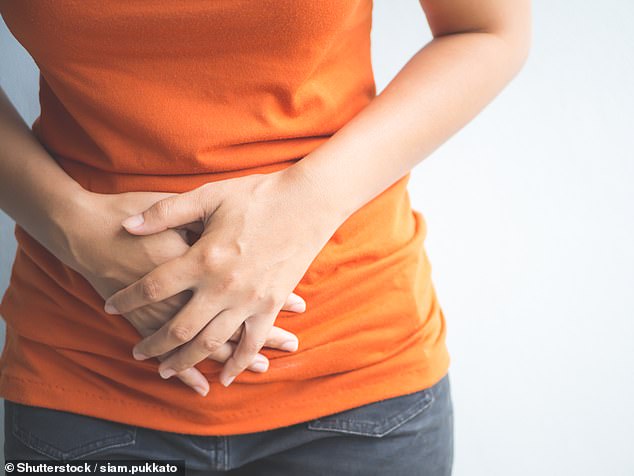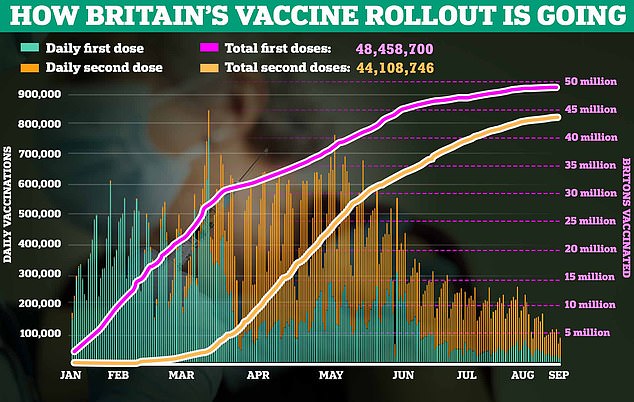Periods which are disrupted by Covid vaccines usually return to normal after one irregular cycle, experts insisted today.
Nearly 35,000 women in Britain have complained of suffering heavier periods — or ones that come earlier or later than usual — after being jabbed.
Officials are yet to accept any link between the jabs and an irregular cycle, despite calls from leading women’s health experts for the issue to be investigated further.
Today, doctors lined up to dismiss fears that the jab may hamper fertility, saying the disrupted periods are ‘transient’ in nature.
Dr Jackie Maybin, a consultant gynaecologist and researcher based at Edinburgh University, said other jabs were known to disrupt periods and that they have had no noticeable impact on fertility.
Covid itself — and other viruses such as HIV — can disrupt the menstrual cycle, too.
But other experts have previously dismissed the theory, saying menstrual problems after jabs were not happening at a higher rate than usual.

Nearly 35,000 women have now come forward to say their periods were disrupted after getting a Covid vaccine, it was revealed today. (stock)

‘I had no period for 20 years… then I had the vaccine’
A 57-year-old mother claims her periods came back after she received the Covid vaccine.
Jacqueline Goldsworthy, a social worker in Barnet, north London, stopped having periods 20 years ago after she got a coil fitted.
When she hit the menopause seven years ago, she started having hormone replacement therapy (HRT) to help with the symptoms.
But after getting her first dose of the AstraZeneca Covid vaccine, Ms Goldsworthy claims her periods returned.

Jacqueline Goldsworthy, 57, from London
‘A week after receiving the jab I was bleeding again,’ she told MailOnline.
‘It must have been the vaccine. I have never bled for 20 years due to the coil and then HRT which I’ve been on for menopause for seven years.’
Ms Goldsworthy said the NHS was ‘faultless’ and immediately sent her for scans to check whether it was something untoward, such as cancer.
But all the results came back negative.
‘When I said to them I thought it was due to the vaccine they said “no way”,’ she added.
‘But the fact I still have not had any answers as to why I was bleeding obviously, I am not the happiest.’
Advertisement
Dr Maybin said: ‘At this stage, it is difficult to be certain regarding the mechanisms causing these effects. It may differ from person to person.
‘The brain, ovaries and womb interact to control the menstrual cycle.
‘Menstrual disturbance may be due to effects on the part of the brain that controls the reproductive hormones, effects on the ovaries or effects directly on the lining of the womb (which is what is shed during a period).
‘In times of stress, the female system is designed to temporarily downregulate to prevent pregnancy and conserve energy.
‘This brain-level effect may explain some of the changes in menstruation observed during the pandemic, with Covid or with vaccination.’
Covid vaccines are designed to initiate an immune response in the body to protect against future Covid infection.
This triggers inflammation which may transiently affect the ovaries, Dr Maybin said.
She added that this could alter their hormone production over one or two cycles, resulting in irregular or heavier menstrual bleeding.
‘The inflammation may also temporarily alter how the womb lining breaks down and sheds, causing a heavier period,’ Dr Maybin said.
‘These effects could lead to temporary changes in menstrual symptoms that should spontaneously resolve.
‘Similar short-term menstrual effects have been reported following HPV vaccination and Hepatitis B vaccination.
‘This suggests that effects are due to either the stress of receiving a vaccination or due to the necessary immune process that occurs to initiate protection.
‘Previous reports are of transient effects on menstrual symptoms and there is no evidence of an impact on fertility.’
She added women who experience persistent menstrual changes and irregular bleeding, or who have vaginal bleeding after the menopause, should speak to their doctor to exclude other serious causes.
For women wishing to conceive who were considering getting the vaccine, she pointed to a guide published by the British Fertility Society.
Dr Raj Mathur, a consultant in reproductive medicine and the chair of the British Fertility Society, told MailOnline yesterday that it was possible that the Covid vaccine was triggering changes to periods.
‘It does appear that the Covid vaccine can be followed by a transient disturbance in the menstrual cycle in some women,’ he said.
‘However, the evidence also shows that there is no effect on fertility or on the risk of miscarriage.
‘Women (and men) who have the Covid vaccine demonstrate no change in their sperm quality or chance of success with IVF.’
Woman, 31, says her periods were delayed after getting the vaccine
A 31-year-old woman claims her periods have been delayed after getting the Covid vaccine.
Faye Leadbeater, a creative director in Manchester, got her first dose in early May, ahead of others in her age group because of her asthma.
Her periods had been regular for years, and she had not taken contraceptive pills, which can disrupt the frequency of the menstrual cycle.
But after getting her first dose of the Pfizer jab she said her periods became ‘irregular’, heavier and were later than normal.

Faye Leadbeater, 31, Manchester
‘After the first dose I saw an irregularity,’ she told MailOnline.
‘After the second vaccine I had the same symptom again.
‘Then when my period came it hit me like a brick wall. When I had my period it was much heavier.’
Ms Leadbeater claimed she had seen people posting about period changes after getting the vaccine before, but thought nothing of it.
But now she wants research to be carried out to establish whether changes to periods are a side effect of the vaccines.
She said: ‘I just want answers really because none of us are medical professionals.
‘[But] no one is giving any scientific answers for how it could be affected, but it is clearly having an affect on things.’
Advertisement
He added that menstrual changes were a common symptom that women report with any stress or illness.
‘Also, the ovaries contain immune cells and these may be affected in the same way as other parts of the body in response to the vaccine,’ Dr Mathur added.
‘In summary, yes this effect is possible, but it does not indicate an underlying problem.’
Nearly 35,000 British women have already come forward to say their periods were disrupted after getting a Covid vaccine, it was revealed today.
The issues were reported in the UK up to September 2.
Although, the majority of affected women found their menstruation returned to normal after one cycle.
Issues were linked to Pfizer, AstraZeneca or Moderna vaccines.
No fertility problems were uncovered, according to an analysis of the data by Dr Victoria Male, a lecturer in reproductive immunology at Imperial College London.
Writing in the British Medical Journal (BMJ), she argued more research was needed to investigate the links.
The Medicines and Healthcare products Regulatory Agency (MHRA) — Britain’s medical regulator — says: ‘The rigorous evaluation completed to date does not support a link between changes to menstrual periods and related symptoms and Covid vaccines.’
Data on the number of period problems following vaccination was collected from the MHRA’s Yellow Card Scheme, which keeps a record of every case of a potential side effect.
But this data is reliant on women coming forward, meaning nearly 35,000 figure could be just the tip of the iceberg.
The MHRA says online it is investigating reports that the jabs have triggered period problems and unexpected vaginal bleeding.
But it adds: ‘The menstrual changes reported are mostly transient in nature.
‘While uncomfortable or distressing, period problems are extremely common and stressful life events that can disrupt menstrual periods.
‘Changes to the menstrual cycle have also been reported following infection with Covid and in people affected by long Covid.’
The MHRA insists: ‘There is no evidence to suggest that Covid vaccines will affect fertility and your ability to have children.’
Guidance published by the Association of Reproductive and Clinical Scientists and the British Fertility Society says there is ‘absolutely no evidence, and no theoretical reason, that any of the vaccines can affect the fertility of women or men’.
The MHRA has yet to uncover any pattern between the vaccines and any increased risk of miscarriage or stillbirth.
Source link : https://www.dailymail.co.uk/news/article-9997823/Periods-affected-Covid-jabs-normally-resort-normal-one-irregular-cycle-say-experts.html











